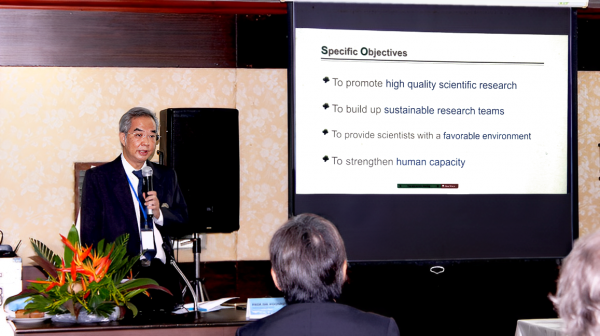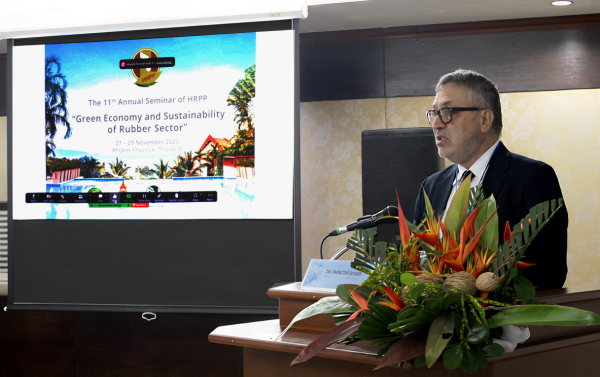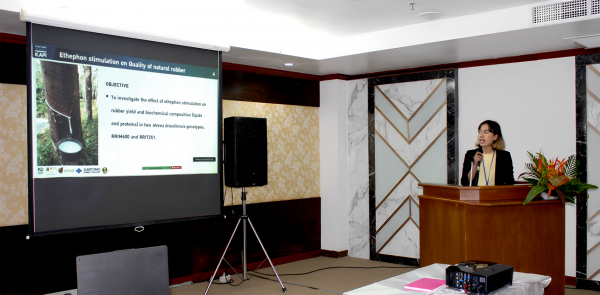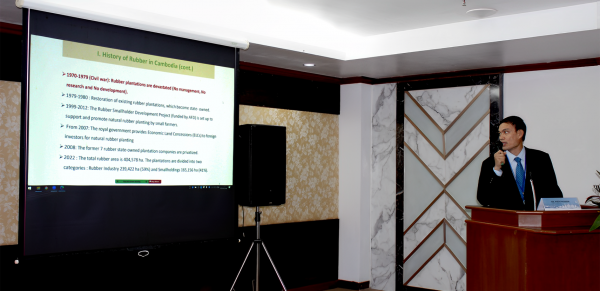- Home
- Worldwide
- Our regional offices
- Continental Southeast Asia
- News : Continental Southeast Asia
- 11th Annual HRPP Seminar
Shaping a Green Future for the Rubber Industry at the Hevea Research Platform in Partnership's 11th Annual Seminar

The 11th Annual Seminar of the Hevea Research Platform in Partnership (HRPP), themed "Green Economy and Sustainability of Rubber Sector" © L. Vo, CIRAD
The 11th Annual Seminar of the Hevea Research Platform in Partnership (HRPP), themed "Green Economy and Sustainability of Rubber Sector," took place from 27th to 29th November 2023 at the Andamantra Resort and Villa in Phuket, Thailand.
This year's seminar, hosted by Prince of Songkla University, was a dynamic forum for over 95 participants, primarily on-site. The event featured a blend of keynote addresses and scientific presentations, complemented by three focused thematic workshops. These workshops delved into specialized topics:
- Remote Sensing and Modeling
- Agroecology
- Integrated Approach to Natural Rubber Quality
This diverse format facilitated a deeper, more nuanced exchange of ideas and strategies in the rubber sector, reinforcing the event's emphasis on integrating environmental and socio-economic perspectives for sustainable industry advancements.
The evolution of the HRPP
In recent years, HRPP experienced two main evolutions: a shift towards a more integrated research approach and an opening of the Franco Thai collaboration to other partners in mainland Southeast Asia countries. Dr. Bénédicte Chambon, agro-economist at CIRAD, specialist in rubber smallholdings, and coordinator of CIRAD team involved in HRPP, emphasized this shift by noting, "The HRPP has evolved significantly, initially being a Thai-French platform, but expanding to include other Southeast Asian countries like Cambodia, and hopefully in the future Vietnam, and Myanmar. This geographical expansion complements our thematic evolution from disciplinary projects to integrated, multidisciplinary approaches, combining fields like agronomy and socio-economics."
Also participating in the event is Dr. Siriluck Liengprayoon, from the Kasetsart Agricultural and Agro-Industrial Product Improvement Institute (KAPI), Kasetsart University, who observed the addition of socio-economic thematics as crucial to understanding the broader implications of rubber farming on communities. The keynote of Dr. Chaiya Kongmanee (PSU) addressed the question of risk and risk management in Thai smallholdings. However, as a whole, during the conference, the presentations dealing with socio-economic approaches were very limited.
HRPP's expansion to include Southeast Asian countries through collaboration with local institutions, such as the Cambodian Rubber Research Institute (CRRI, associated member) reflects its growing regional influence. This collaboration fosters shared solutions to common regional challenges, some of them highlighted by the keynote of Mr. Phen Phearun (CRRI).
Adapting to Global Changes: A focus on Market Shifts and New Regulatory Challenges
Facing challenges like climate change and market volatility, HRPP has adapted its research priorities. Dr. François Roger, CIRAD Regional Director for Continental Southeast Asia, addresses new challenges in his opening speech, "the EU Rule against Deforestation (EUDR) prohibits the entry of certain commodities into EU territory whose production is linked to deforestation [like] natural rubber. As a result, supporting farmers and the natural rubber sector in producing nations to comply with new and existing rules, such as EUDR, should be a priority.”
Companies need to adapt to international standards and align with the increasing demands for sustainability and environmental responsibility. This topic was analyzed during the seminar, with insightful presentations such as Dr. Weeraphart Khunrattanasiri from Kasetsart University, on the 'Possible Impacts of the EU Deforestation-free Products Regulation (EUDR) on Rubber Originating from Thailand.' His presentation shed light on the specific challenges and implications for the Thai rubber industry. Furthermore, Ms. Rungnapa Wattanavichian from PEFC Thailand provided a deep dive into 'PEFC Group Certification for Natural Rubber Smallholder Communities in Thailand,' emphasizing the role of voluntary certification in promoting sustainable practices.
CIRAD's natural rubber specialist, Dr. Laurent Vaysse, the first coordinator of the HRPP, highlighted the platform’s role in the face of significant challenges from the impact of the new EUDR and evolving consumer demands, "as intermediaries, we aim to bridge the gap between European regulatory bodies and the realities of small, family-owned rubber farms in Southeast Asia."
Balancing Environmental Benefits and Economic Viability in Rubber Production
The seminar's agenda aligns closely with the current observations of the environmental impact of rubber production. The keynote of Dr. Alain Karsenty (CIRAD) reminded the participants of the principles and evolution of carbon markets in agriculture. Key discussions revolved around innovative approaches to rubber cultivation and their environmental implications. One such approach, the low-frequency, upward-tapping system, was highlighted for its potential to enhance carbon sequestration in rubber plantations significantly. This technique promises to reduce CO2 emissions substantially and offers a sustainable pathway for the industry, balancing economic viability for farmers with much needed environmental benefits.
The diversity of presentations stands as a testament to the collaborative spirit in research and higher education of HRPP. It operates with a clear objective to elevate the competitiveness and sustainability of rubber-based farms, alongside increasing the local value-added in natural rubber production. Central to its raison d'être, HRPP is committed to promoting high-quality scientific research, building sustainable research teams, fostering a favorable environment for scientists, and importantly, strengthening human capacity. These objectives form the cornerstone of HRPP's mission, guiding its approach to addressing the multifaceted challenges and opportunities within the rubber industry.
Charting the Future for the Global Rubber Industry
This year's HRPP tended its focus beyond environmental sustainability, with key presentations on vital aspects of the rubber industry's supply chain. Mr. Phen Phearun from the Cambodian Rubber Research Institute (CRRI) presented on 'Challenges of Rubber Sector in Cambodia, current research, and research to develop to face them,' highlighting the essential partnership aspect of HRPP, especially in Southeast Asia. Additionally, the seminar explored downstream supply chain aspects, focusing on practices and quality in rubber production through various discussions and workshops. These segments provided valuable insights into processing and quality control, crucial for maintaining industry standards and enhancing product value. This comprehensive approach by HRPP, addressing both upstream and downstream factors, demonstrates its commitment to fostering a balanced and inclusive advancement of the rubber sector.
Recognizing the increasing significance of social sustainability in the sector's performance, the HRPP platform served as a crucial forum for stakeholders to exchange ideas and strategies for the future of natural rubber production, fostering collaborative efforts between researchers, policymakers, farmers, and industry leaders.




























